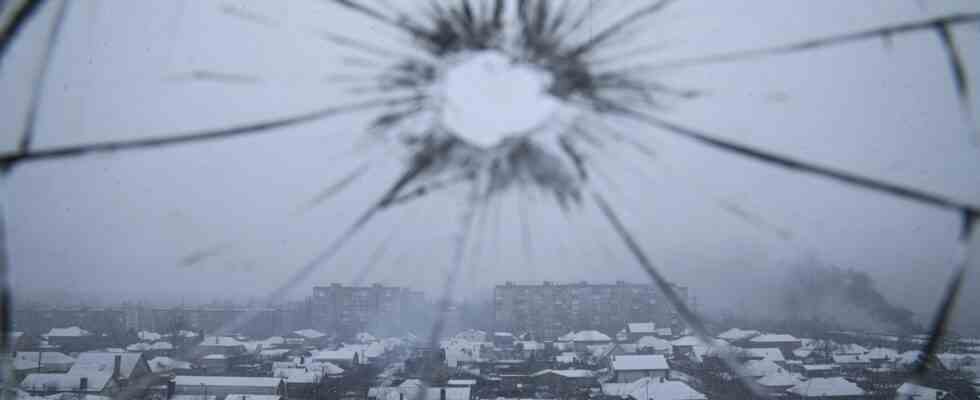Exclusive
Status: 08/16/2022 11:12 a.m
The war against Ukraine is being accompanied by a Kremlin propaganda offensive. Authorities expect even more disinformation. But the federal government is having a hard time fighting Moscow’s lies — that’s about to change.
The Federal Chancellor in front of a turbine. It’s a picture that recently caused some criticism and malice. At the beginning of August, Olaf Scholz visited the Siemens plant in Mülheim an der Ruhr and posed demonstratively next to the module that is said to be so urgently needed in Russia so that gas can once again flow through the Nord Stream 1 Baltic Sea pipeline in full. Gazprom recently claimed that there were no documents from Germany to bring the turbine to Russia.
“It is obvious that nothing, absolutely nothing, stands in the way of the further transport of this turbine and its installation in Russia,” emphasized Scholz. “It can be transported and used at any time. The reduction in gas supplies via Nord Stream 1, the non-fulfilment of gas supply contracts has no technical reasons whatsoever.” Scholz’s appearance in front of the gas turbine seemed like a rather helpless fact check in the face of the flood of Russian propaganda and disinformation. So far, the federal government has obviously found it difficult to fight Moscow’s lies, but now wants to take stronger action against them.
More Kremlin propaganda expected
Because the security authorities assume that Kremlin propaganda will continue to increase in the coming months and that the focus will shift: from the war in Ukraine to the impending energy crisis and its consequences for the population. Moscow’s propagandists, including state and non-state actors, are apparently relying on certain narratives, such as that the economic sanctions imposed would harm the West more than Russia. Or that Western sanctions are responsible for the food shortages in many poor regions of the world, especially in Africa.
Basically, according to the experts in the Federal Ministry of the Interior, the population must be made preventively sensitized to the targeted attacks on facts and realities. At the same time, media competence must be strengthened so that untruths and targeted manipulations can be recognized independently. So far, however, there has often been a lack of scientific knowledge about which lies and half-truths get caught in society, how disinformation works and whose opinions are influenced in the long term.
A few years ago, when it became clear that Moscow was trying to influence democratic processes through covert activities, the federal government set up a platform – a working group (AG) called “Hybrid”. There, several ministries and authorities regularly exchange views on so-called “hybrid threats”. The Chancellery, the Federal Ministry of the Interior and the Foreign Office are also involved, as are the Federal Press Office, the Federal Office for the Protection of the Constitution (BfV) and the Federal Intelligence Service (BND).
The experts try to recognize such “active measures”, as the targeted lies are called, at an early stage, above all by evaluating the Internet and the media, and to develop countermeasures. So far, the “Hybrid” working group has mainly produced confidential situation reports and analyzes for the government that were not accessible to the public.
For example, the BND has investigated Russian attempts to influence the past presidential election in France and is also supposed to take a look at such activities in the forthcoming parliamentary elections in Sweden in September.
Faster enlightenment or warnings
The Office for the Protection of the Constitution has recently been providing public information on the federal government’s measures on its website under the heading “Together against disinformation”. In the future, the authorities should play an even more aggressive role in deconstructing the fabrications of lies and strengthening social resilience by providing even faster clarification or warnings in the event of certain incidents or identified propagandists.
Further projects are also to be initiated at EU level, which also involve supporting civil society actors, such as Russian journalists in exile. Likewise, Russian attempts at deception and lies are to be countered more clearly at the diplomatic level in the future.
The German government’s position should also be made clear abroad, according to the strategy, so as not to leave the authority to interpret certain events and developments to the Kremlin. In the future, diplomatic staff should position themselves more strongly and get involved in public discourses. Where there used to be silence, there should now be more contradiction.
The ban on broadcasting the Russian propaganda channel Russia Today (RT) in the EU – which is by no means uncontroversial – is proving to be moderately successful. The station’s content will also continue to be distributed online in this country. There are also voices within the authorities that call for tougher, more targeted action against the Kremlin propagandists and point to the possibility of criminal prosecution.
Reluctant to prosecute so far
At the beginning of August, a 31-year-old German was arrested in Hamburg who is said to have supported Russia’s war of aggression against Ukraine with propaganda on social networks. He is said to have spread the Z symbol and also posed in a photo with an assault rifle. According to the investigators, this is a criminal offense: the approval of a criminal offense under international criminal law.
“According to previous investigations, the accused was responsible for the Telegram channel ‘The Other Germany’, which saw itself as a pro-Russian national-Bolshevik platform on which sympathy for the war of aggression against Ukraine instigated by Russia was openly expressed,” said the public prosecutor With.
So far, the authorities have been reluctant to prosecute those who support the war. Therefore, the case could now become a precedent. The arrested Hamburger faces up to three years in prison if convicted.

